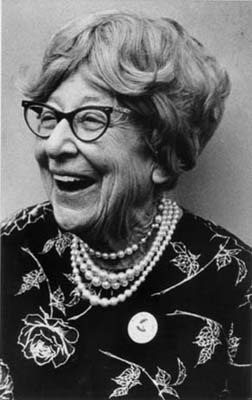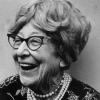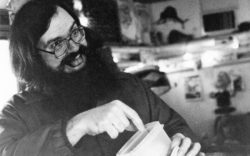It utterly amazes me how many people here have no conception of what really happened—both here and elsewhere—during the 1960’s and 1970’s. Instead, they fly off half-cocked, daydreaming about things that never were as if they had been and letting that go at that. A major case in point: I meet people who are interested in or participating actively in the Anti-War Movement quite often; same is true of budding Feminists. It is flabbergasting to me to learn how few of these folks living in Athens, Georgia are unaware—or UNDERaware—of someone who spent many of her more-many years living first in Bogart and then Watkinsville: both towns within ten miles of As-We-Speak. I lead you on, an intellectual tease, for a reason. Who do I allude to? Think. Don’t be afraid. No matter how many beers you had last night, you still have plenty of grey cells left to hold knowledge: THINK. Give up yet? Okay, I’ll tell you.
Miss Jeannette Rankin.

Miss Jeannette Rankin
Does her name ring any bells? Do the telephones in your mind go “trllt-trllt” like Miss Rankin’s in Watkinsville used to? I doubt it, but—for once—I intend to write a column that is truly educational to you, because I went out and dug up the facts to help educate myself. May be a lost cause for me, but I haven’t given up on you yet, dear readers. Press onward and learn, I hope.
Miss Jeannette Rankin was born near Missoula, Montana on June 11, 1880. Montana, a territory at the the time, never had legislation that forbade women from voting or holding public office. There being no territorial ban on such, a woman could, ostensibly, be elected from there to hold a Federal office, in spite of the fact that on a National level, women had not yet given up being considered “property” and were not allowed to vote uniformly until 1920. My grandmother, Sarah Thella Jones Hendricks, was arrested and jailed for marching for the right to vote in Aberdeen, South Dakota awaay back in 1913: she was carrying my mother at the time—perhaps this is what makes my Mom so fiesty! I am only slightly ahead of myself at this point. My grandfather was very progressive politically and encouraged her to speak her mind, something most husbands found abhorrent in 1913… and plenty still do now. Miss Jeannette, however, had parents who nurtured her through college and on into graduate school in New York at about this time. This was enough of a rebellious act for many women, but the trip to New York City, where she could not vote, was enough to impress Miss Rankin to go back to Montana and immerse herself in politics.
A staunch (although quite liberal) Republican, she was encouraged by family, Feminists, and friends alike to run for the U.S. House at-large from Montana in 1917. She did, and she won. For this alone, she would go down in history: the first woman elected to Federal office; a not-to-be-forgotten feat. But that’s only the beginning.
After being in office only six days, she was faced with a great dilemma: war with Germany was looming, and her family encouraged her to vote for entry into the war so as to facilitate her re-election and thus spread, if gently, her feminist beliefs. Most Suffragettes were also pro-entry, save Alice Paul, who was a Quaker: a member of the pacifist Religious Society of Friends. To vote for entry into the war, Feminists urged, would destigmatize women, discouraging people to think of them as “sob-sisters”—far-fetched now, but a very real problem for women in 1917.
The vote in the Senate was 82 for entry and 6 against; the House contained 56 members who voted against entry into World War I: among them was Jeannette Rankin. “War is a vulgar indictment of the free will of the American people,” she opined. “I want to stand by my country, but I cannot vote for war. I vote no.”
An avalanche of mail followed, as could be expected. The bulk of letter writers called Miss Rankin (she preferred that term to “Ms.” even in 1972, saying that titles were unimportant: the struggle was what mattered. “Why get bogged down in rhetoric when there is so much work to do?” she was quoted once.) next to a prostitute or a mental unfit, certainly ungainly attributes for America’s first Congresswoman. She held her head high, served out her term, and left office unceremoniously. Her brother Wellington had warned her “You know you’re not going to be re-elected… there will be a lot of feeling.” “I’m not interested in that,” she replied. “All I’m interested in is what they will say 50 years from now.” It was only a little more than 50 years later that she spoke at the University of Georgia campus for the Viet Nam War Moratorium, October 15, 1969. Fifteen hundred people listened intently. There were few hecklers. But I’m getting slightly ahead of myself again.
Just after Christmas, 1924, she paid $500 for 64 acres of land on the unpaved Monroe Highway near Bogart, Georgia. This land could have been in Clarke County or Oconee County, or maybe in both. It’s right where the four-lane U.S. 78 passes now, and her cabin is gone. But she chose the spot because of its closeness to Athens and Atlanta, and was welcomed into the local community in spite of the fact that she was away a large portion of the time. For example, she became Field Secretary of the American Section of The Women’s International League for Peace and Freedom in 1925, which took her all over the world. Still, she chose to come back to Georgia whenever time allowed.
She was hired to give a series of lectures at Brenau College in Gainesville, Georgia. There was quite a stink over this in October and November, 1934: seems the American Legion protested because of her anti-war vote in 1917. Several editors, though, including Atlanta’s influential Clark Howell took her side in the fracas. The weekly Gainesville Eagle, now defunct, defended her in print in late 1934 in a series of award-winning editorials. I assume these are on microfilm at the University; I haven’t had time to check. Maybe now some of you will…
Fate found her back in Montana in the late 1930’s, her Georgia farmhouse destroyed in an accidental kerosene fire and her property sold. She again became politically active, and many of her enemies had had time to mellow. She ran for the at-large Congress seat from Montana and was elected again. By now, of course, women had had the right to vote for 20 years, the Suffrage League long since had turned into The League of Women Voters, and women held offices all across the nation. Eyebrows that were raised by her mere mention in 1918 were unquivering now. The time for women was arriving: finally, finally.
The clouds of war began to glower ugly in the political sky again. Caricatured German and Japanese barbarians again invaded newspaper pages as members of various armies tromped over Europe, chomping up the likes of Estonia and Latvia just as Prussia had been munched down on 25 or so years earlier. Miss Jeannette watched in horror at the mounting tension from her seat in Congress. Finally, the Japanese War Lords, their thirst for territory insatiable, bombed Pearl Harbor. President Roosevelt asked Congress to declare war. On December 8, 1941 this vote was taken: the Senate voted 82 to 0; the House tally was 388 in favor of entry into World War II and one lone vote against: Miss Jeannette Rankin, R-Mont. She was booed and hissed and was forced to tear out of the House chamber to hide in a nearby telephone booth, where she dialed the Capitol Police to rescue her. Finally asked for an explanation of her vote, she explained: “As a woman, I cannot go to war. I refuse to send anyone else.” Incredibly, her again-avalanche of mail ran slightly in her favor from her constituents: she probably could have been re-elected in 1942; in fact, several prominent Montanans encouraged her in that regard. Even more amazing is that just when she was saying to her brother Wellington ” I have nothing left except my integrity,” her out-of-state mail tallied 10-to-1 on her side. The courageous Southern author Lillian Smith, writer of “Strange Fruit” and “Killers Of The Dream,” was one of Miss Rankin’s strongest supporters; the Quakers remained strangely silent.
“American women will be liberated only when they prohibit their men from going to war,” she stressed, unbowed. “I certainly feel sorry for the poor Jews and Negroes after this war.” She didn’t explain that, but you can easily draw your own conclusions.
Upon leaving office in 1942, she returned to Athens to look for land. She could never buy a farm that someone else had tilled, she once told someone, because instead she wanted to blaze her own trails. Her dream was fulfilled when she located land three miles from Watkinsville, Georgia and built a dwelling of her own design that came to be called The Round House. It remains, modified severely, on Mars Hill Road, directly across from the gymnasium of Oconee County High School and readily visible in the daytime. (Please don’t go bother the folks who live there: I don’t know that I know them.) She called it “Shady Grove.”
Her work was not done. She travelled widely in the 1940’s and 1950’s, particularly to India. It was her wish to meet Gandhi, whose works she had soaked in like a sponge. A trip to India in 1948 only brought her grief, because while she was nearby, Gandhi was assassinated. “His work must live one,” she told someone, pledging to devote even more of her energies to peaceful causes.
In the 1960’s, she became known as a free-spirited octegenarian who surrounded herself with questioning young people at her Round House. She rented rooms to them when they had noplace to go, let them borrow and read her books, and opened her door gently to all comers. Her living room floor was of tamped earth festooned with rugs from over the world. The locals never gave her trouble, she informed speculants, because she never gave them any. She reportedly bailed someone out of jail in 1967, posting property bond when even his family would not. “Is it a greater crime to smoke a silly little weed, or to arm the world for The Last War?” she reportedly asked the authorities at the time.
One of her roundhouse discussions one night concerned Gandhi’s walks across India from town to town teaching peace when he was 77 years old. Gandhi fasted and only took fruit juice and water along his route. “Do you think you could have done that?” she was asked. “Yes, perhaps, but I think it might be better to march on Washington instead,” she replied. One thing led to another, telephone lines hummed and clacked from Watkinsville and back again, and as the undeclared was in Viet Nam droned on in the far distance, plans were laid for such a march. Called The Jeannette Rankin Brigade, it took place in Washington, D.C. on January 15, 1968—5,000 women clad in black addressed their grievance: “End the war,” they asked.
Miss Rankin returned to Georgia, driving her own battered car. She became in much demand as an eloquent speaker for anti-war causes. The culmination of this locally was when she spoke, as I earlier alluded, to 1,500 people outside of Memorial Hall on campus on October 15, 1969 on Moratorium Day. “My views on peace have never changed,” she asserted. “I have always been an advocate of peace. I am fearful that warfare in this nuclear age will be the downfall of Mankind.” She uttered these words in 1961 before “No Nukes” was a conventional dissent; I’d imagine she could just as easily have spoken them in 1969. Or now.
She considered running for Congress at age 92 in 1972, but finally gave up the idea because of her age. She would have been the oldest Congressperson ever elected had she won. By this time, she was a staunch proponent of a unicameral legislature (of all states, only Nebraska has this one-body system) and also favored abolition of the Electoral College. “I’ve always liked to go on the ‘one woman, one vote’ basis,” she teased.
Asked to speak in California in 1972, she took an apartment in Carmel to be close to the ocean and between Los Angeles and San Francisco. While there, she lost the ability to speak and was forced to communicate through writing instead. Being unable to talk depressed her so severely that many times she expressed the wish to die. Her physician refused to take her off life-giving medications, only lowering her more. NAture took its course and she died in her sleep in her apartment on May 18, 1973, only a month short of her 93rd birthday. In accordance with her wishes, her body was cremated and her ashed scattered over the Pacific Ocean at 5:30 that very afternoon. Her wish was that her remains be allowed to touch all shores, symbolically, to emphasize to anyone her desire that they see the world as a small planet and all continents, communities, and countries as interlocked. Her reported last written message was in answer to a “Well, what can I do?” type of question. “Teach Peace,” she reportedly wrote.
Locally, tribute was paid her on May 27, 1973 at Oconee County Elementary School, across the road from The Round House she had designed.
Thanks to the Oconee County Library folks who were very helpful, even letting me stay a few minutes after closing to finish my jottings; to my Stepfather Buddy for use of his truck while Ruby is in the shop; and to Melissa Williams, Melanie Aaron, and Jennifer Lapidus for inculcating and nurturing the idea(s) for this column. It could have been a book, lemme tell ya. And maybe someday it will be.
(30.)
Like what you just read? Support Flagpole by making a donation today. Every dollar you give helps fund our ongoing mission to provide Athens with quality, independent journalism.










